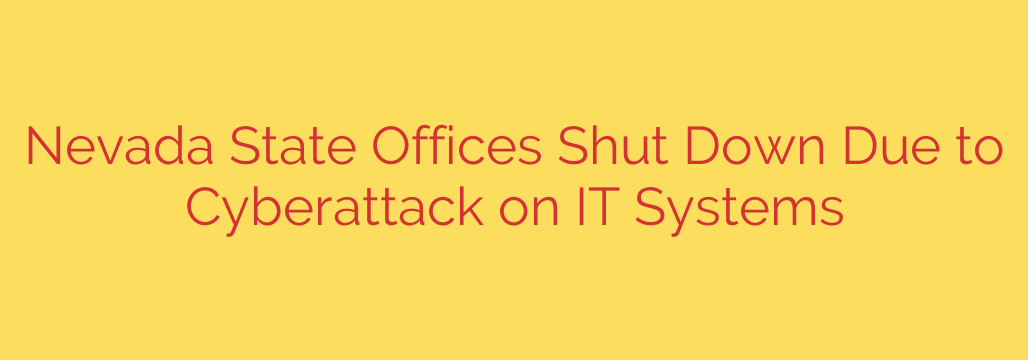
Major Cyberattack Paralyzes Nevada State Services: What You Need to Know
Nevada’s state government is currently grappling with a significant cyberattack that has forced multiple state offices to shut down their IT systems, disrupting essential public services across the state. The incident serves as a stark reminder of the increasing vulnerability of public sector infrastructure to sophisticated digital threats.
Official sources confirmed that the disruption was a deliberate response to a cybersecurity incident. To prevent the attack from spreading and to protect sensitive data, state officials made the critical decision to proactively shut down IT systems across several key agencies. This preventative measure, while necessary, has led to a widespread operational halt, impacting both government employees and the public they serve.
Which Agencies Are Affected?
The impact of the shutdown is extensive, affecting some of the state’s most critical departments. While a full list is still emerging, the following key agencies are confirmed to have been impacted:
- The Nevada Department of Health and Human Services (DHHS): This includes divisions responsible for public assistance, welfare, and other vital social services.
- The Department of Public Safety (DPS): This disruption could potentially affect various law enforcement and emergency response administrative functions.
- Other state-level agencies that rely on the central IT network.
Employees at the affected offices were reportedly instructed not to come into work or were unable to perform their duties due to the system-wide outage. This has effectively paused many government functions until the IT environment can be secured and restored.
The Investigation and Response
A multi-agency investigation is now in full swing. Nevada’s Office of the Chief Information Officer is leading the response, working alongside state and federal law enforcement partners, including the FBI. The primary goals are to identify the source and scope of the attack, eradicate the threat from state networks, and safely bring services back online.
At this time, officials have not specified the exact nature of the cyberattack, such as whether it was a ransomware incident, nor have they identified the threat actors responsible. The focus remains on containment and restoration. The state has emphasized that protecting the personal information of Nevada residents is its top priority during the ongoing investigation.
What This Means for Nevada Residents
The shutdown of government IT systems has immediate, real-world consequences. Residents may experience significant delays or an inability to access essential services, including:
- Processing of public assistance and benefits.
- Online services for licensing and registration.
- Communication with state agency personnel.
This incident highlights how dependent modern governance is on digital infrastructure and how disruptive a targeted attack can be for citizens who rely on these services daily.
Actionable Security Tips for the Public
While the state manages this specific incident, it’s a critical moment for everyone to reassess their own digital security. In the wake of large-scale attacks on institutions that hold your personal data, taking proactive steps is more important than ever.
- Be Vigilant About Phishing: Threat actors who breach one system often use the stolen information to launch convincing phishing campaigns. Be extra cautious of unsolicited emails or text messages that claim to be from a Nevada state agency. Never click on suspicious links or provide personal information in response to an unsolicited request.
- Monitor Your Financial Accounts: Keep a close eye on your bank and credit card statements for any unusual activity. If you see a charge you don’t recognize, report it to your financial institution immediately.
- Consider a Credit Freeze: If you are concerned that your sensitive information may have been compromised, you can place a free credit freeze with the three major credit bureaus (Equifax, Experian, and TransUnion). This restricts access to your credit report, making it harder for identity thieves to open new accounts in your name.
- Use Strong, Unique Passwords: Ensure that your passwords for different online accounts are unique and complex. A password manager can help you create and store strong passwords securely. Enable two-factor authentication (2FA) wherever possible for an added layer of security.
As Nevada officials work to restore systems and secure the state’s digital infrastructure, this event underscores the persistent and evolving threat of cyberattacks against public institutions.
Source: https://www.bleepingcomputer.com/news/security/nevada-closes-state-offices-as-cyberattack-disrupts-it-systems/








